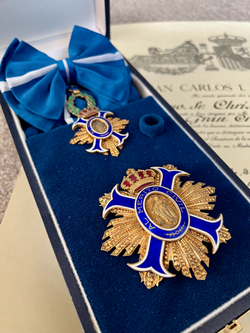| Royal Order of Civil Merit Real Orden del Mérito Civil | |
|---|---|
 Grand Cross set of insignia of the Order | |
| Awarded by the Spanish Monarch | |
| Type | Order of merit, Knighthood |
| Established | 1926 |
| Royal house | House of Bourbon-Spain |
| Motto | "Al Mérito Civil" For Civil Merit |
| Eligibility | Spanish and Foreign citizens |
| Awarded for | Extraordinary services for the good of the Nation |
| Status | Currently Constituted |
| Grand Master | King Felipe VI |
| Grand Chancellor | José Manuel Albares, Minister of Foreign Affairs |
| Chancellor | Undersecretary of Foreign Affairs |
| Grades | Collar Grand-Cross Commander by Number Commander Officer Cross Cross Silver Cross |
| Post-nominals | OMC |
| Former grades | Grand-Cross Commander by Number Commander Knight Silver Cross |
| Precedence | |
| Next (higher) | De facto, there is no higher civil order. De iure, the Order of Charles III is the highest civil honour; however, it is almost exclusively granted to government ministers. |
| Next (lower) | Civil Order of Alfonso X, the Wise |
| Equivalent | Order of Isabella the Catholic (for diplomatic relations) |
The Ribbons of the Order | |
The Royal Order of Civil Merit (Spanish: Real Orden del Mérito Civil; Abbr.: OMC) is a knighthood and one of the three preeminent orders of merit bestowed by the Kingdom of Spain, alongside the Order of Charles III (established in 1771) and the Order of Isabella the Catholic (established in 1815). Each of the three orders aims to reward a distinct type of achievement. The Order of Charles III primarily honors heads of state and high-ranking government officials, while the Order of Isabella the Catholic primarily rewards services that strengthen diplomatic relations across the former Spanish Empire. In contrast, the Order of Civil Merit was created by King Alfonso XIII of Spain in 1926 to recognize "the civic virtues of the officials in the service of the State, as well as the extraordinary services of Spanish and foreign citizens for the good of the Nation." It was, therefore, founded as a modern order of merit, dedicated to acknowledging exceptional deeds for the benefit of civil society.[1]
Royal Decree 2396/1998, enacted on November 6, 1998, regulates the Order today. In accordance with this law, the Order seeks to “reward merits of a civil nature, acquired by officers of any of the public Administrations [...], or by persons outside the Administration, who provide or have provided relevant services to the State, with extraordinary work, charitable initiatives, or with exemplary perseverance in the fulfillment of their duties." The Order "may also be granted to people of foreign nationality, provided that they have rendered distinguished services to Spain or notable collaboration in all matters that benefit the Nation.”[2]
The great prestige that the Order of Civil Merit enjoys in Spain and internationally is due to several reasons. First, like the Order of Isabella the Catholic, it has become a powerful instrument of international relations, with recipients worldwide. Second, it is a highly selective and rare honour – since its creation, a relatively small number of people worldwide have received the Order of Civil Merit, compared to other national orders of merit with larger memberships, such as UK's Order of the British Empire, France's Legion of Honour, Germany's Order of Merit of the Federal Republic of Germany, or Italy's Order of Merit of the Italian Republic.[3] Third, members of the Order enjoy various legal privileges, including a style of address, a heraldic achievement, and the exclusive right to wear the medal, rosette and ribbon of the Order.
- ^ "Decorations". Spain's Ministry of Foreign Affairs. 19 June 2024.
- ^ BOE. "Real Decreto 2396/1998, de 6 de noviembre, por el que se aprueba el Reglamento de la Orden del Mérito Civil" (in Spanish). Retrieved 27 October 2016.
- ^ "Anexo:Condecorados con la Orden del Mérito Civil", Wikipedia, la enciclopedia libre (in Spanish), 21 May 2024, retrieved 19 June 2024